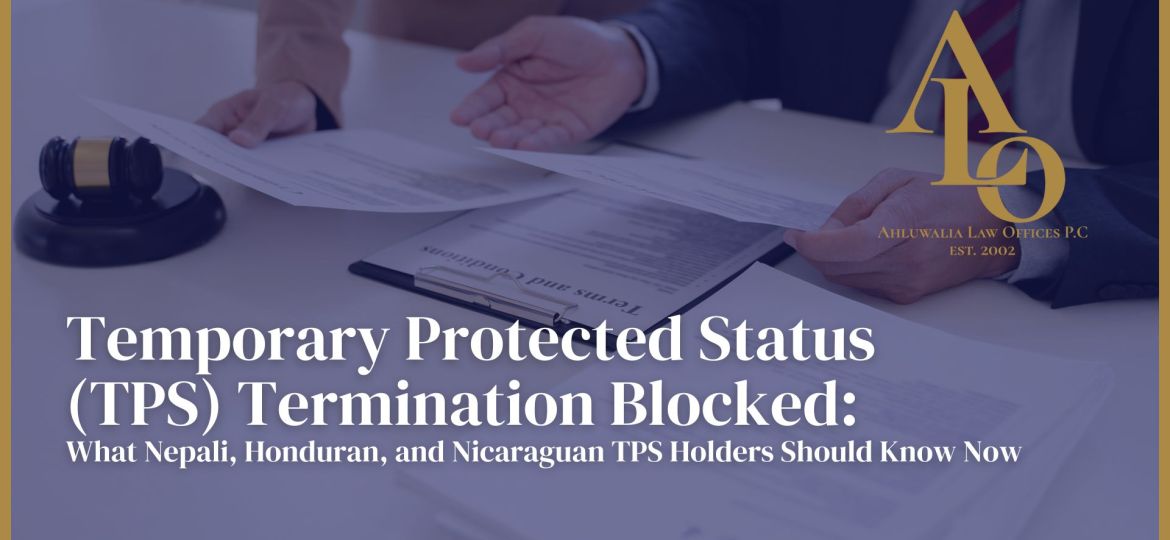
On July 31, 2025, the United States District Court for the Northern District of California issued a pivotal ruling in National TPS Alliance et al. v. Noem et al.: the court temporarily blocked the Department of Homeland Security (DHS) from terminating TPS for nationals of Nepal, Honduras, and Nicaragua. This decision provides temporary relief for over 300,000 TPS beneficiaries and their families, many of whom have built decades-long lives in the U.S. under legal protection.
The injunction will remain in place until at least the next court hearing on November 18, 2025, and may be extended depending on the merits of the case.
What Led to the Court’s Decision?
In June and July 2025, DHS published Federal Register notices terminating TPS for:
- Nepal (effective August 5, 2025),
- Honduras and Nicaragua (effective September 8, 2025).
The court found strong indications that these terminations may have been politically motivated rather than based on an objective assessment of country conditions, as required under the Immigration Act of 1990 (8 U.S.C. § 1254a). Specifically:
- The terminations cited Executive Order 14160, also known as the “Invasion EO,” which framed TPS recipients as public safety risks and economic burdens.
- DHS failed to consider relevant humanitarian conditions, including natural disasters, political instability, and public health challenges that persist in all three nations.
- The agency also abruptly changed its long-standing practice of granting six-month transition periods, giving TPS holders just 60 days to prepare for potential deportation, without explanation.
The court concluded that plaintiffs are likely to succeed in proving both violations of the Administrative Procedure Act (APA) and the Fifth Amendment’s Equal Protection Clause, citing evidence of racial animus and pretextual policymaking.
What Does This Mean for TPS Holders?
If you are a TPS beneficiary from Nepal, Honduras, or Nicaragua, your status is preserved for now under a court-issued injunction. However, this is a temporary ruling, and the Department of Homeland Security (DHS) may appeal. The next hearing is scheduled for November 18, 2025, and the outcome will determine whether TPS terminations proceed or are permanently halted.
Principal Attorney Pallavi Ahluwalia notes:
“We are currently awaiting official USCIS guidance . Until then, TPS holders must remain cautious, compliant, and legally prepared.”
Here’s What You Can Do While You Wait:
1. Confirm your current TPS registration and EAD validity:
Ensure your work authorization is up to date and properly renewed. You are still lawfully present under TPS.
2. Explore permanent immigration options:
Many long-time TPS holders may be eligible for:
- Family-based green cards through U.S. citizen spouses or children,
- Employment-based green cards,
- Humanitarian relief such as asylum, withholding of removal, or cancellation of removal (if applicable),
- Adjustment of status, if you entered the U.S. lawfully and are otherwise eligible.
3. Avoid unlawful presence and criminal violations:
Maintain clean records. Even minor infractions can jeopardize immigration relief.
4. Update your employer and consult with counsel:
Notify your employer of your valid TPS status. If your work permit is close to expiration, legal counsel can help you request extensions or explain the court ruling to your HR department.
5. Stay informed on court developments:
The next hearing is set for November 18, 2025. Be aware that the government could appeal the ruling, and TPS designations may be subject to change depending on political shifts or legal strategies.
Why This Case Matters
This is not just about immigration law—it’s about due process and the government’s obligation to act within the bounds of law, not political ideology. The plaintiffs in this case are nurses, parents, homeowners, small business owners, and community volunteers—many of whom have lived in the U.S. for over 20 years.
The court stated unequivocally:
“Color is neither a poison nor a crime.”
TPS was created to protect individuals from deportation to unsafe or uninhabitable countries. This case affirms that protection should be based on evidence and law, not rhetoric.
Final Note
If you or a loved one is currently under TPS, now is the time to plan ahead. At Ahluwalia Law Offices, we are committed to helping you navigate these uncertain times with clarity and legal strategy.

